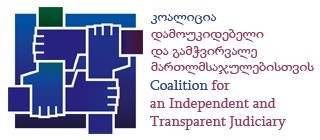


 The Coalition negatively assesses the High Council of Justice’s decision from November 16, 2015 to appoint seven judges to Tbilisi Appellate Court based on a non-competitive process. We believe that this process is not only unhelpful for promoting public trust in the judiciary, but also raises questions regarding the objectives and motivation of the HCOJ and overall success of the ongoing reforms in the judicial system.
The Coalition negatively assesses the High Council of Justice’s decision from November 16, 2015 to appoint seven judges to Tbilisi Appellate Court based on a non-competitive process. We believe that this process is not only unhelpful for promoting public trust in the judiciary, but also raises questions regarding the objectives and motivation of the HCOJ and overall success of the ongoing reforms in the judicial system.
Even before the November 16 vote, the judicial promotion procedures were subjected to serious criticism both from the side of non-governmental organizations, as well as the Public Defender of Georgia. The criticism was directed towards all stages of the non-competitive appointment of judges. Specifically:
• The promotion of judges to Tbilisi Appellate Court was carried out on the basis of Article 37 of the Organic Law on Common Courts, which sets very ambiguous rules for appointing judges without a competition. The article does not set any procedure or criteria for the non-competitive appointment of judges and provides unlimited discretion to the HCOJ to transfer (promote) judges to a higher level, the same level or lower instance courts without any substantiation. We, non-governmental organizations have been criticizing the flawed practice of applying this Article by the HCOJ (in the period of 2011-2015 the total of 115 judges have been transferred between courts on the basis of this rule. By comparison, there are 230 judges in the system);
• The HCOJ has made a decision to promote judges to Tbilisi Appellate Court using the Article 37 without preliminarily defining appropriate procedures or criteria. These procedures and criteria were developed by the HCOJ only after the judges wishing to be promoted had already submitted their applications to the HCOJ. The procedure and criteria were set in haste, and the interested parties were deprived of a real opportunity to participate;
• Public Defender voiced grave criticism of the interview process held for the promotion purposes. The Public Defender’s statement reads: “It does not seem that the majority of the HCOJ members are interested in fully exploring and evaluating the judicial skills and potential of the candidates.”
During one of the hearings where the issue of the non-competitive promotion was discussed, a doubt was voiced that there existed a concrete list of judges, whose appointment to Tbilisi Appeals Court was already planned. This doubt deepened due to the flawed process, the way the interviews were conducted and the fact, that each of the seven candidates who were appointed from the pool of 29 received 10 votes at the first stage of voting.
On November 13, 2015 Public Defender of Georgia once again published a statement calling on the HCOJ to consider findings of monitoring carried out by the Public Defender’s Office, which, according to PD, reflect PD’s recommendations over the years to start disciplinary proceedings against specific judges and the parliamentary reports.
At the November 16, HCOJ meeting Public Defender, as well as the domestic and international organizations present at the meeting, called on the HCOJ to take into account the PD’s monitoring findings while making appointment decisions to fill in the vacancies at Tbilisi Appellate Court. We believe that it was absolutely essential for HCOJ to study and discuss the PD monitoring report, refute the doubts regarding impartiality of specific judges and also to give each candidate a chance to respond to allegations. This would allow HCOJ to promote only those judges, who have unblemished professional reputation and high qualification.
However, on November 16, HCOJ decided to appoint/promote seven judges to Tbilisi Appellate Court without holding a competition. HCOJ did not consider any recommendations of local and international organizations and the Public Defender at any stage of the process.
All of the above strengthen doubts regarding objectiveness of the Tbilisi Appellate Court judicial appointments and seriously undermine public trust in the judiciary. In this process of uncompetitive judicial appointments, HCOJ had to demonstrate that in appointing and especially – promoting judges, HCOJ is guided by the principle of impartiality and independence of judges. HCOJ had to show that it promoted those judges who had executed justice in such a way that did not raise serious doubts either in the society or from such an important Constitutional body, as the Public Defender.